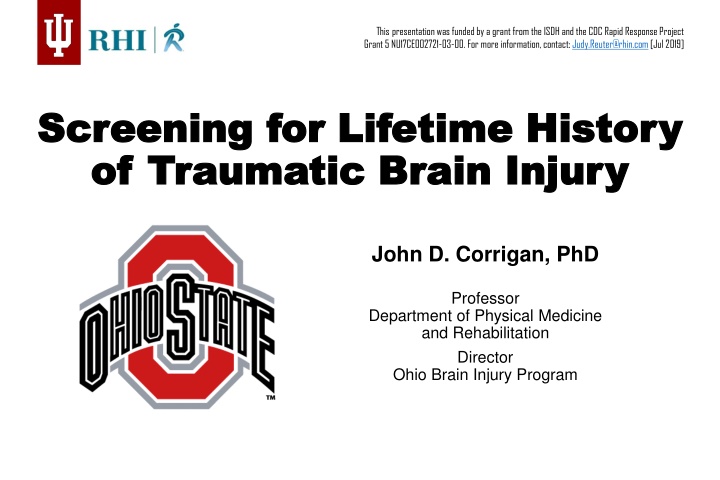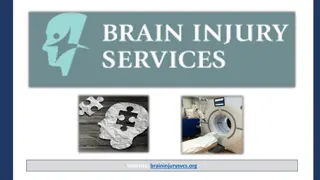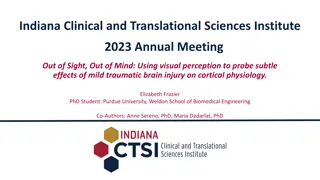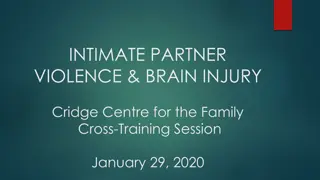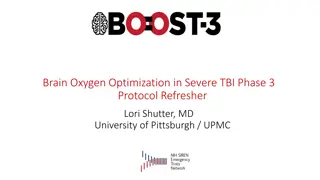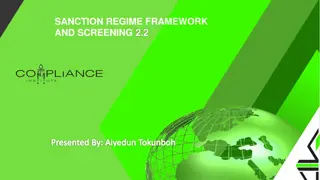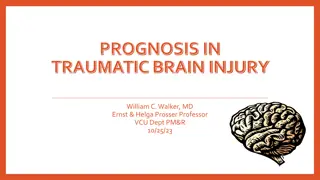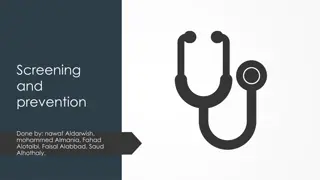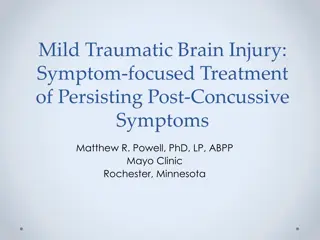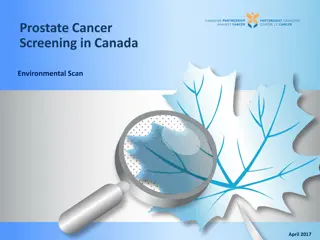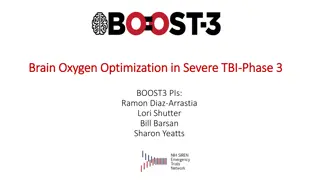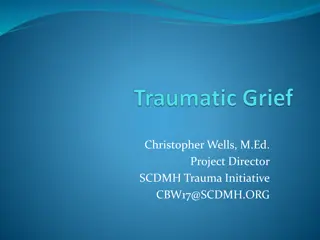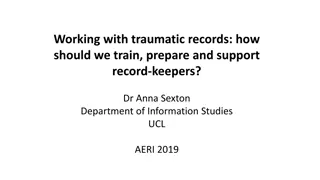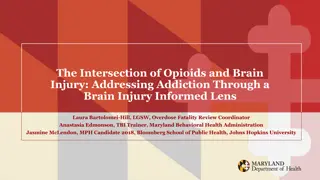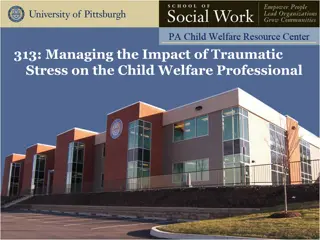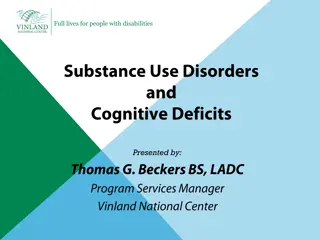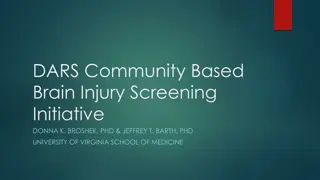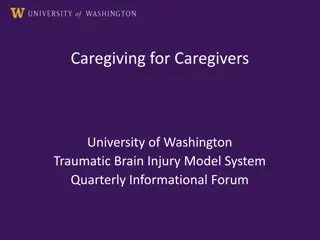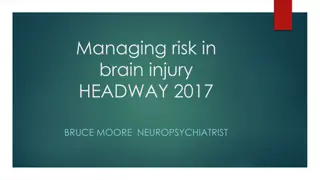Screening for Traumatic Brain Injury History
This presentation, funded by a grant from ISDH and CDC, delves into methods to assess lifetime history of traumatic brain injury (TBI). Challenges in identifying TBI, eliciting self-reports, and selected tools for self-report assessment are discussed in detail.
Download Presentation

Please find below an Image/Link to download the presentation.
The content on the website is provided AS IS for your information and personal use only. It may not be sold, licensed, or shared on other websites without obtaining consent from the author.If you encounter any issues during the download, it is possible that the publisher has removed the file from their server.
You are allowed to download the files provided on this website for personal or commercial use, subject to the condition that they are used lawfully. All files are the property of their respective owners.
The content on the website is provided AS IS for your information and personal use only. It may not be sold, licensed, or shared on other websites without obtaining consent from the author.
E N D
Presentation Transcript
This presentation was funded by a grant from the ISDH and the CDC Rapid Response Project Grant 5 NU17CE002721-03-00. For more information, contact: Judy.Reuter@rhin.com[Jul 2019] Judy.Reuter@rhin.com Screening for Lifetime History Screening for Lifetime History of Traumatic Brain Injury of Traumatic Brain Injury John D. Corrigan, PhD Professor Department of Physical Medicine and Rehabilitation Director Ohio Brain Injury Program
This presentation was funded by a grant from the ISDH and the CDC Rapid Response Project Grant 5 NU17CE002721-03-00. For more information, contact: Judy.Reuter@rhin.com[Jul 2019] Judy.Reuter@rhin.com Financial Disclosure Financial Disclosure I have no financial relationships to disclose relevant to this presentation.
This presentation was funded by a grant from the ISDH and the CDC Rapid Response Project Grant 5 NU17CE002721-03-00. For more information, contact: Judy.Reuter@rhin.com[Jul 2019] Judy.Reuter@rhin.com Objective: Objective: How can you determine if a person has a problematic history of TBI?
This presentation was funded by a grant from the ISDH and the CDC Rapid Response Project Grant 5 NU17CE002721-03-00. For more information, contact: Judy.Reuter@rhin.com [Jul 2019] Judy.Reuter@rhin.com Issues Assessing a Lifetime History of TBI Capture from medical encounters medical treatment often may not be sought lifetime records not available mild TBI often missed in Emergency Departments Biomarkers imaging, neuropsych assessment specific but not sensitive proteomics very acute only and sensitive but not specific Retrospective self-report cannot self-diagnose not aware of injury ( telescoping, poor memory, too young) Gold Gold Standard Standard
This presentation was funded by a grant from the ISDH and the CDC Rapid Response Project Grant 5 NU17CE002721-03-00. For more information, contact: Judy.Reuter@rhin.com [Jul 2019] Judy.Reuter@rhin.com Challenges Eliciting Self-reports Public s limited or inaccurate knowledge Need to stimulate recall Injuries before age 5 Concurrent sources of altered consciousness Periods of multiple blows to the head
This presentation was funded by a grant from the ISDH and the CDC Rapid Response Project Grant 5 NU17CE002721-03-00. For more information, contact: Judy.Reuter@rhin.com [Jul 2019] Judy.Reuter@rhin.com Selected Methods of Eliciting Self-report TBI-TAC identified 20 different tools being used DVBIC Brief TBI Screen (BTBIS; Schwab et al.) TBI Questionnaire (TBIQ; Diamond et al.) Brain Injury Screening Questionnaire (BISQ; Gordon et al.) OSU TBI Identification Method (OSU TBI-ID; Corrigan & Bogner) Boston Assessment of Traumatic Brain Injury Lifetime (BAT-L; Fortier et al.)
This presentation was funded by a grant from the ISDH and the CDC Rapid Response Project Grant 5 NU17CE002721-03-00. For more information, contact: Judy.Reuter@rhin.com [Jul 2019] Judy.Reuter@rhin.com
This presentation was funded by a grant from the ISDH and the CDC Rapid Response Project Grant 5 NU17CE002721-03-00. For more information, contact: Judy.Reuter@rhin.com [Jul 2019] Judy.Reuter@rhin.com Neurological correlates of lifetime history of TBI from the OSU TBI-ID
This presentation was funded by a grant from the ISDH and the CDC Rapid Response Project Grant 5 NU17CE002721-03-00. For more information, contact: Judy.Reuter@rhin.com [Jul 2019] Judy.Reuter@rhin.com OSU TBI OSU TBI Identification Method Identification Method Structured interview designed to elicit lifetime history of TBI. Avoids misunderstanding about what a TBI is by eliciting injuries, then determining if altered consciousness occurred. Provides more information than simple yes/no
This presentation was funded by a grant from the ISDH and the CDC Rapid Response Project Grant 5 NU17CE002721-03-00. For more information, contact: Judy.Reuter@rhin.com [Jul 2019] Judy.Reuter@rhin.com OSU TBI-ID: Step 1 5 Questions: The goal of these questions is to help recall injuries to the head or neck by reminding the respondent about hospital visits and probing for common causes of TBI. Do not be concerned about whether a TBI occurred, only if it was possible.
This presentation was funded by a grant from the ISDH and the CDC Rapid Response Project Grant 5 NU17CE002721-03-00. For more information, contact: Judy.Reuter@rhin.com [Jul 2019] Judy.Reuter@rhin.com fell off of bike--ER car crash 1st husband hit me
This presentation was funded by a grant from the ISDH and the CDC Rapid Response Project Grant 5 NU17CE002721-03-00. For more information, contact: Judy.Reuter@rhin.com [Jul 2019] Judy.Reuter@rhin.com OSU TBI-ID: Step 2 Determine if a TBI occurred Were you knocked out or did you lose consciousness (LOC)? If yes, how long? If no, were you dazed or did you have a gap in your memory from the injury? How old were you?
This presentation was funded by a grant from the ISDH and the CDC Rapid Response Project Grant 5 NU17CE002721-03-00. For more information, contact: Judy.Reuter@rhin.com [Jul 2019] Judy.Reuter@rhin.com fell off of bike--ER car crash 1st husband hit me X X 9 X 14 X early 20 s
This presentation was funded by a grant from the ISDH and the CDC Rapid Response Project Grant 5 NU17CE002721-03-00. For more information, contact: Judy.Reuter@rhin.com [Jul 2019] Judy.Reuter@rhin.com OSU TBI OSU TBI- -ID: ID: Step 3 Step 3 Determine if there were any periods with repeated blows to the head Have you ever had a period of time in which you experienced multiple, repeated impacts to your head (e.g., history of abuse, contact sports, military duty)? If yes, what was the typical or usual effect were you knocked out (Loss of Consciousness LOC If no, were you dazed or did you have a gap in your memory from the injury? What was the most severe effect? How old were you?
This presentation was funded by a grant from the ISDH and the CDC Rapid Response Project Grant 5 NU17CE002721-03-00. For more information, contact: Judy.Reuter@rhin.com [Jul 2019] Judy.Reuter@rhin.com fell off of bike--ER car crash 1st husband hit me X X 9 X 14 X early 20 s 1st husband hit me X X 21 23
This presentation was funded by a grant from the ISDH and the CDC Rapid Response Project Grant 5 NU17CE002721-03-00. For more information, contact: Judy.Reuter@rhin.com [Jul 2019] Judy.Reuter@rhin.com Problematic History of TBI Problematic History of TBI Worst lifetime TBI was moderate or severe First TBI with loss of consciousness occurred in childhood Had 2 or more TBIs close together or a period of time when they experienced multiple blows to the head. A mild TBI in recent weeks or a more severe TBI in recent months. Any history of TBI when combined with one or more other sources of compromised brain function.
This presentation was funded by a grant from the ISDH and the CDC Rapid Response Project Grant 5 NU17CE002721-03-00. For more information, contact: Judy.Reuter@rhin.com [Jul 2019] Worst was a moderate TBI First with loss of consciousness in childhood Had a period of multiple blows to the head Judy.Reuter@rhin.com fell off of bike--ER car crash 1st husband hit me X X 9 X 14 X early 20 s 1st husband hit me X X 21 23
This presentation was funded by a grant from the ISDH and the CDC Rapid Response Project Grant 5 NU17CE002721-03-00. For more information, contact: Judy.Reuter@rhin.com [Jul 2019] Judy.Reuter@rhin.com Problematic History of TBI Problematic History of TBI Due to cognitive and/or behavioral weaknesses that result from damage to the frontal areas of the brain, person with a problematic history of TBI may have difficulty: knowing what problems they have; changing their behavior; accessing services; and/or remaining engaged in services.
This presentation was funded by a grant from the ISDH and the CDC Rapid Response Project Grant 5 NU17CE002721-03-00. For more information, contact: Judy.Reuter@rhin.com [Jul 2019] Judy.Reuter@rhin.com THANK YOU Additional information and training at: www.ohiovalley.org
